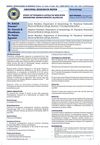24 citations,
September 2014 in “PloS one” Thyroid hormone receptors are essential for hair growth and wound healing.
 June 2024 in “Archives of dermatological research”
June 2024 in “Archives of dermatological research” Dietary supplements might help prevent post-COVID hair loss, but serum ferritin is not a reliable indicator.
 July 2018 in “International journal of clinical & experimental dermatology”
July 2018 in “International journal of clinical & experimental dermatology” Eat a balanced diet for healthy hair; only use supplements if you have a proven nutrient deficiency.

Low vitamin D3 is not linked to different levels of thyroid hormones in people with autoimmune thyroid disease.
 January 2019 in “Clinical neuropharmacology”
January 2019 in “Clinical neuropharmacology” A girl's hair-pulling condition improved greatly after she started vitamin D treatment.
 10 citations,
July 2018 in “Our Dermatology Online”
10 citations,
July 2018 in “Our Dermatology Online” Some vitamins and minerals are important for preventing hair loss, but treating hair loss with them without a known deficiency is not proven effective.
 July 2021 in “Rossiiskii Zhurnal Kozhnykh i Venericheskikh Boleznei”
July 2021 in “Rossiiskii Zhurnal Kozhnykh i Venericheskikh Boleznei” Low vitamin D levels are linked to more skin problems.
1 citations,
August 2021 in “Arhivʺ vnutrennej mediciny” Hormonal imbalances can cause hair loss, and understanding them can help develop better treatments.
 9 citations,
November 2014 in “Journal of Cutaneous Medicine and Surgery”
9 citations,
November 2014 in “Journal of Cutaneous Medicine and Surgery” Many dermatologists in Saudi Arabia recommend vitamins and minerals for hair loss, often based on personal experience rather than strong evidence.
 1 citations,
January 2018 in “Journal of clinical & experimental dermatology research”
1 citations,
January 2018 in “Journal of clinical & experimental dermatology research” The study found no link between vitamin D deficiency and psoriasis but suggests more research is needed.
 4 citations,
August 2016 in “JEADV. Journal of the European Academy of Dermatology and Venereology/Journal of the European Academy of Dermatology and Venereology”
4 citations,
August 2016 in “JEADV. Journal of the European Academy of Dermatology and Venereology/Journal of the European Academy of Dermatology and Venereology” Using cetirizine on the skin and taking vitamin D can help increase hair growth in children with hair loss from ectodermal dysplasia.
 3 citations,
November 2021 in “World Journal of Clinical Pediatrics”
3 citations,
November 2021 in “World Journal of Clinical Pediatrics” Vitamin D might help treat some types of hair loss, but more research is needed.
 2 citations,
May 2022 in “Cosmetics”
2 citations,
May 2022 in “Cosmetics” Further research is needed to understand how the microbiome affects hair loss in Alopecia Areata.
 October 2021 in “International Journal of Research in Dermatology”
October 2021 in “International Journal of Research in Dermatology” People with alopecia areata often have low vitamin D levels, which may worsen their hair loss.
 September 2020 in “University of Thi-Qar Journal of Medicine”
September 2020 in “University of Thi-Qar Journal of Medicine” Low iron and vitamin D3 levels might be major causes of hair loss in Iraqi women.
 January 2020 in “Turkiye Klinikleri Journal of Dermatology”
January 2020 in “Turkiye Klinikleri Journal of Dermatology” People with chronic hair shedding had much lower vitamin D levels compared to healthy people.
 40 citations,
August 2018 in “Skin appendage disorders”
40 citations,
August 2018 in “Skin appendage disorders” Some alternative treatments for hair loss might work, but more research is needed.
 September 2023 in “Clinical, Cosmetic and Investigational Dermatology”
September 2023 in “Clinical, Cosmetic and Investigational Dermatology” Higher SHBG levels are linked to less severe hair loss in women, but vitamin D levels don't seem to affect hair loss.
 5 citations,
January 2020 in “The mental health clinician”
5 citations,
January 2020 in “The mental health clinician” Vitamin D supplements may reduce hair-pulling in people with Trichotillomania.
 2 citations,
March 2018 in “Clinical Nutrition ESPEN”
2 citations,
March 2018 in “Clinical Nutrition ESPEN” Low vitamin D levels are linked to symptoms like muscle cramps, fatigue, and hair loss.
 10 citations,
August 2021 in “Journal of Cosmetic Dermatology”
10 citations,
August 2021 in “Journal of Cosmetic Dermatology” Most patients with telogen effluvium had low iron and vitamin D levels; iron supplements were commonly prescribed.
 1 citations,
January 2018 in “Journal of Steroids & Hormonal Science”
1 citations,
January 2018 in “Journal of Steroids & Hormonal Science” Oral vitamin D treatment can help some children with alopecia areata who have vitamin D deficiency.
 1 citations,
February 2017 in “MOJ bioequivalence & bioavailability”
1 citations,
February 2017 in “MOJ bioequivalence & bioavailability” Treating hair loss effectively may require a multi-sided approach, using different treatments together, and topical treatments could be more effective and safer than oral ones.
 11 citations,
January 2014 in “Egyptian Journal of Dermatology and Venereology”
11 citations,
January 2014 in “Egyptian Journal of Dermatology and Venereology” Women losing hair might have lower levels of vitamin D.
 February 2024 in “Medicina-lithuania”
February 2024 in “Medicina-lithuania” Obesity and bariatric surgery can cause hair thinning and temporary hair loss due to nutritional deficiencies and stress.
 July 2023 in “Dermatology practical & conceptual”
July 2023 in “Dermatology practical & conceptual” Low hemoglobin levels are significantly correlated with hair loss in women with Telogen Effluvium.
 January 2025 in “Egyptian Journal of Dermatology and Venerology”
January 2025 in “Egyptian Journal of Dermatology and Venerology” COVID-19 vaccination may lower vitamin D levels and cause hair loss.
 2 citations,
April 2019 in “Acta medica Philippina/Acta Medica Philippina”
2 citations,
April 2019 in “Acta medica Philippina/Acta Medica Philippina” People with alopecia areata often have lower vitamin D levels than healthy people.
 January 2022 in “International Journal of Medicine in Developing Countries”
January 2022 in “International Journal of Medicine in Developing Countries” Many patients with hair loss had low iron and vitamin D levels, but thyroid issues were not common.
 July 2021 in “PARIPEX INDIAN JOURNAL OF RESEARCH”
July 2021 in “PARIPEX INDIAN JOURNAL OF RESEARCH” Men with early baldness often have low vitamin D levels.



























